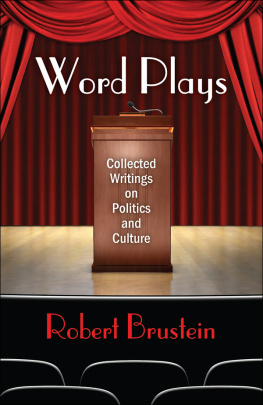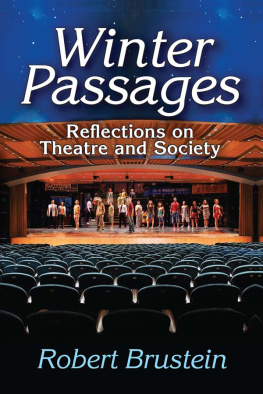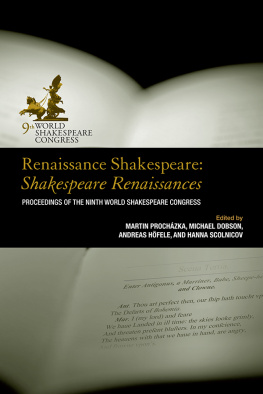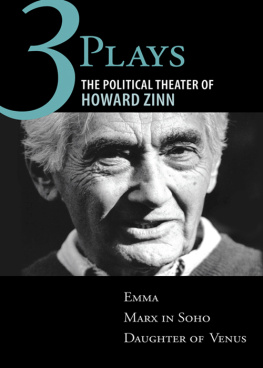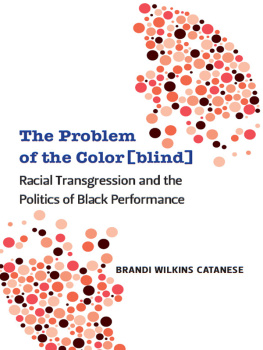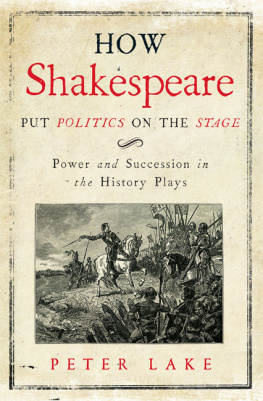Word Plays
Word Plays
Collected Writings on
Politics and Cluture
Robert Brustein
First published 2017 by Transaction Publishers
Published 2017 by Routledge
2 Park Square, Milton Park, Abingdon, Oxon OX14 4RN
711 Third Avenue, New York, NY 10017, USA
Routledge is an imprint of the Taylor & Francis Group, an informa business
Copyright 2017 by Taylor & Francis
All rights reserved. No part of this book may be reprinted or reproduced or utilised in any form or by any electronic, mechanical, or other means, now known or hereafter invented, including photocopying and recording, or in any information storage or retrieval system, without permission in writing from the publishers.
Notice:
Product or corporate names may be trademarks or registered trademarks, and are used only for identification and explanation without intent to infringe.
ISBN-13: 978-1-4128-6504-3 (hbk)
ISBN-13: 978-1-4128-6561-6 (pbk)
Library of Congress Cataloging-in-Publication Data
A catalog record for this book has been requested
Dedication
To all those who try to improve the theater, and to my beloved soul mate, Doreen, who does her best to improve me.
Contents
I wish to express my warm gratitude to all those who helped me with this book. First, my good friends, Gene Goodheart and Leslie Epsteintwo, often insufficiently celebrated, Solons of our culture. Second, the always welcoming and indispensable Huffington Post. Third, Andrew McIntosh and Mary E. Curtis at Transaction Publishers. Fourth, Samuel French, which has published three of these short plays as part of the Boston Theatre Marathon series. And finally, Kate Snodgrass, producer of that series, to whom I offer deep thanks, with much love.
This is my fourteenth book of collected articles, and probably my last. Approaching my ninetieth birthday as we ready for press in January 2017, I can, of course, attribute such a sober prediction to my advanced age. But it is also shadowed by the conclusion of Obamas last term. I have grown more and more convinced that this extraordinary man has, almost by himself alone, kept a lot of us from despair during the last eight years of this Republic.
But not quite. For at the same time that we were being led by one of the best-informed men in the history of the presidency, most of his advances were being blocked by one of the most recalcitrant opposition parties in the history of Congress.
And the beat goes on. The Republican-dominated Senate and House were elected by the same voters who are now seriously considering making Donald Trump the leader of what once was called the free world. (n.b. Alas, that atrocious possibility became a grim reality as this book was going to press.) There have been other scary, rabble-rousing, proto-Fascist politicians in American historyHuey Long of Louisiana, for example, and George Wallace of Alabama. But while these men harbored presidential ambitions, they did not enjoy the support of a large number of the electorate. I cant imagine Donald Trump winning the presidency either. But the fact that he has gained so much support among the angry and the disenchanted is a frightening and virtually unprecedented development in our history.
What does a playwright and theater professor have to contribute to such a frightening political dilemma that media commentators and newspaper columnists have not already chewed over? Probably very little, except perhaps the capacity to look at the situation from a different perspective. I have never believed that culture and politics were separable categories. While always suspicious of propaganda plays, and highly alert to any sign of governmental intervention in the arts other than funding them, I have never wavered from a belief that culture and politics were tangential. The most productive example of such an alliance was the Federal Theatre under Hallie Flanagan Davis during its brief (four year) tenure in the 1930s. The most negative instance was the Un-American Activities Committee in the House under Martin Dies and, in the Senate, the Red-baiting McCarthy Committee.
Are Americans better protected today under our government than Egyptians under Morsi or Syrians under Assad or the great majority of rulers, including a few European ones, who close their prison doors on controversial artists? Of course we are. But that doesnt mean that we should weaken our vigilance regarding any constraints on artistic freedom, short of that shout of fire in that crowded room.
Most of us would rather be shouting no more seats in a crowded theater or no more copies in a congested bookstore. But while I have not always been able to fill a lot of seats with my plays, and rarely sold a lot of my books, I hope that this collection might help others achieve those elusive goals. Thank you for tolerating me over the past six decades.
I
Literary Word Plays
1
The Contemporary American Theater
Calling the American theater our most incisive record of American culture and society might seem like saying that the local strip joint is the best archive for the writings of Ludwig Wittgenstein. Even during the greatest periods of theater, serious critics have considered dramatic literature a lower form of activity. Sir Philip Sidney, who was William Shakespeares contemporary, called the Elizabethan drama a poor stepsister of the arts. Imagine how he would have scorned that ugly orphan known as the American theater! When the Harkness family offered Harvard, in the 1920s, a million dollars to build a stage for George Pierce Baker and his celebrated English 47 playwriting class, the university rejected the grant, saying, We dont give degrees in butchering meat. (It may have been the first and only time in history that Harvard ever turned down a financial gift.) Baker took the money anyway and brought it to New Haven to form what would later be called the Yale School of Drama.
One of the first things the Puritans did after taking power in England in 1642 was to shut down the theaters. What an act of criticism! The clergyman John Harvard carried this legacy with him when he founded Harvard in 1638. It is not hard to understand the origins of religious contempt and academic scorn for the theater, a lot of which survives to the present day.
All through the previous century and up to the brink of World War I, our stage was dominated largely by melodrama, burlesque, vaudeville, and minstrel shows. The theater was hardly a place to examine pressing problems and urgent contemporary issues. It was a large bedroom where tired businessmen could snooze through soporific entertainment, totally indifferent to the vagaries of human character, much less to social, political, or metaphysical ideas.
It is true that Shakespeare, who embraced all imaginable dramatic concerns, remained a popular figure in the American theater, and not only on the New York stage. There were a number of national touring Shakespearean troupes on the road as well, bringing bowdlerized versions of Hamlet and Othello to Denver and St. Louis via overland trails. There is no doubt an apocryphal story that when Othello was being performed in a small Texas town, one Western witness got so riled up that he pulled out his six-gun and shot the actor playing Iago. (Killer and victim, the legend goes, were buried side by side with gravestones marked Here lies the perfect actor and Here lies the perfect spectator.)

